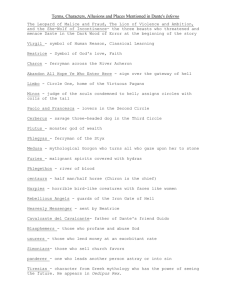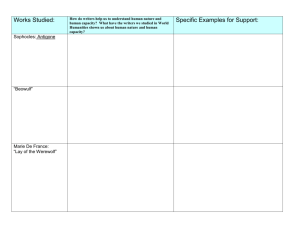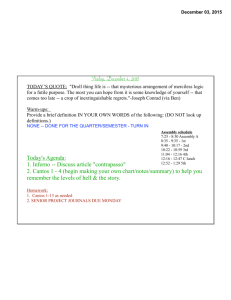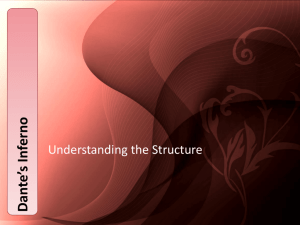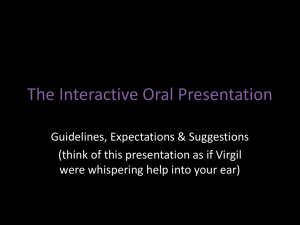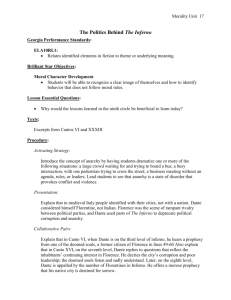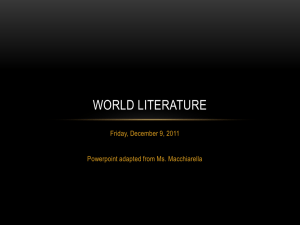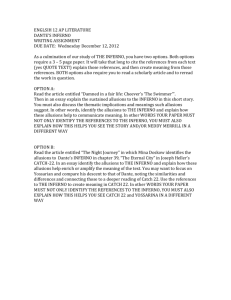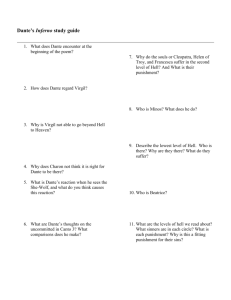Dante's Inferno (in Translation)
advertisement
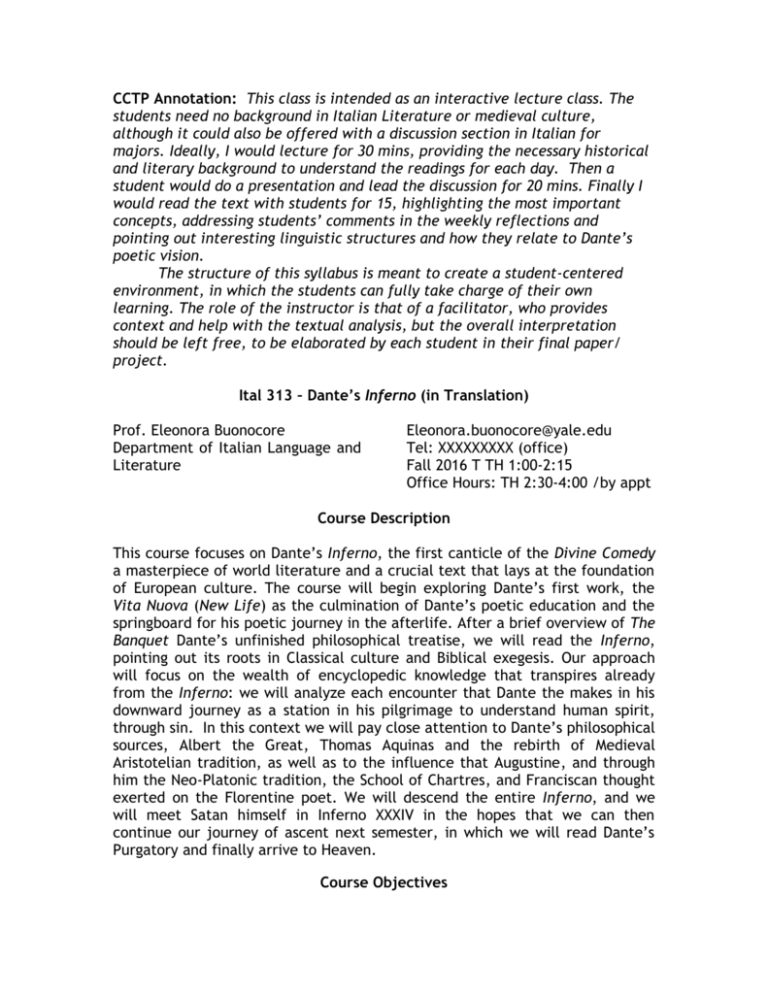
CCTP Annotation: This class is intended as an interactive lecture class. The students need no background in Italian Literature or medieval culture, although it could also be offered with a discussion section in Italian for majors. Ideally, I would lecture for 30 mins, providing the necessary historical and literary background to understand the readings for each day. Then a student would do a presentation and lead the discussion for 20 mins. Finally I would read the text with students for 15, highlighting the most important concepts, addressing students’ comments in the weekly reflections and pointing out interesting linguistic structures and how they relate to Dante’s poetic vision. The structure of this syllabus is meant to create a student-centered environment, in which the students can fully take charge of their own learning. The role of the instructor is that of a facilitator, who provides context and help with the textual analysis, but the overall interpretation should be left free, to be elaborated by each student in their final paper/ project. Ital 313 – Dante’s Inferno (in Translation) Prof. Eleonora Buonocore Department of Italian Language and Literature Eleonora.buonocore@yale.edu Tel: XXXXXXXXX (office) Fall 2016 T TH 1:00-2:15 Office Hours: TH 2:30-4:00 /by appt Course Description This course focuses on Dante’s Inferno, the first canticle of the Divine Comedy a masterpiece of world literature and a crucial text that lays at the foundation of European culture. The course will begin exploring Dante’s first work, the Vita Nuova (New Life) as the culmination of Dante’s poetic education and the springboard for his poetic journey in the afterlife. After a brief overview of The Banquet Dante’s unfinished philosophical treatise, we will read the Inferno, pointing out its roots in Classical culture and Biblical exegesis. Our approach will focus on the wealth of encyclopedic knowledge that transpires already from the Inferno: we will analyze each encounter that Dante the makes in his downward journey as a station in his pilgrimage to understand human spirit, through sin. In this context we will pay close attention to Dante’s philosophical sources, Albert the Great, Thomas Aquinas and the rebirth of Medieval Aristotelian tradition, as well as to the influence that Augustine, and through him the Neo-Platonic tradition, the School of Chartres, and Franciscan thought exerted on the Florentine poet. We will descend the entire Inferno, and we will meet Satan himself in Inferno XXXIV in the hopes that we can then continue our journey of ascent next semester, in which we will read Dante’s Purgatory and finally arrive to Heaven. Course Objectives You will know the context surrounding Dante’s Inferno, and be familiar with Medieval Italian History of XIII and XIV c. You will understand and recognize Dante’s poetic style, starting from the poetic device of Terza Rima You will be able to identify key characters in the Inferno, and point out their significance in the context of the poem You will determine and analyze the crucial theological and philosophical issues at play in Inferno, including Dante’s harmonization of a Christian and Aristotelian Ethics You will be able to discern and interpret the medieval concept of allegory and how it contributes to Dante’s creation of meaning in Inferno. Course Requirements (Including Assessment Methods and Grade Breakdown) 1. Regular attendance and participation in class, which includes doing the weekly readings and actively contributing to class discussion on a regular basis (15%) 2. At home weekly responses 10% 3. One in class presentation (of approximately 15 minutes) 10% 4. Five in class Quizzes 10% 5. Mid-term exam (15%) 3. Final exam (20%) 4. A final Paper (approx. 3000 words) or equivalent Project (25%) Course Materials Primary Texts: Dante. Inferno, trans. John D. Sinclair (New York: Oxford University Press, 1968) Dante. Vita Nuova (The New Life), trans. Mark Musa (Bloomington: Indiana University Press, 1973) Dante. Convivio (The Banquet), trans. Richard H. Lansing (New York: Garland, 1990) St. Augustine. Confessions, trans. Henry Chadwick (Oxford; New York: Oxford University Press, 1991) Virgil. The Aeneid, trans. Allen Mandelbaum (Berkeley: University of California Press, 2007) Secondary Readings: John Freccero, Dante the Poetics of Conversion Giuseppe Mazzotta, Dante and the Circle of Knowledge AAVV. Articles provided by instructor on a need be basis Course Schedule (Unless otherwise specified by instructor) 1st week - Introduction to Dante and his times - The Book of Memory and Dante’s poetic memory (The New Life - 1st part) nd 2 week - Lost in the Dark Wood (Inferno I and II) - Entering the Gates of Hell (Inferno III) 3rd week - Poets and Philosophers in Limbo (Inferno IV) - Dante’s own poetic philosophy: The Convivio (selections) 4th week - Dante’s love poetry (The New Life – 2nd part) - Sinners and Lovers (Inferno V) 5th week - In the political Arena (Inferno VI- VIII) - Understanding the Structure of Hell (Inf. IX-XI) 6th week - Violence - In the woods of suicides: Pier delle Vigne (Inferno XIII) 7th week - Meeting Dante’s Teacher of Rhetoric: Brunetto Latini (Inferno XV) - Midterm exam 8th week - Geryon (Inferno XVI and XVII) - Popes and (Inf. XIX) 9th week - Sibyls and Prophets (Inf. XX- XXI) - The Demons of Malebolge (Inf. XXII – XXIII) 10th week - The Seventh Bolgia: A Centaur and a Thief (Inferno XXIV- XXV) - Ulysses’ Rhetoric of exploration (Inferno XXVI) 11th week - Guido da Montefeltro’s last counsel (Inferno XXVII) - The Contrappasso and the Sowers of Discord (Inferno XXVIII- XXXIX) 12th week - Giants as Towers (Inferno XXX- XXXI) - Frozen Hell: Traitors (Inferno XXXI- XXXII) 13th week - Count Ugolino’s Tragedy (Inferno XXXII and XXXIII) - The Encounter with Satan (Inferno XXXIV)
